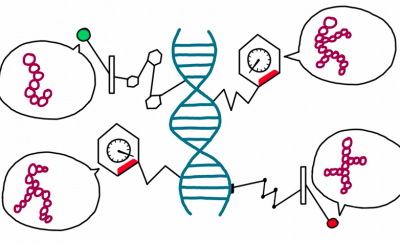Adventure Travel
Is the urge to travel in your DNA?

Image: Wikipedia
If you are one of those people who loves to travel, you likely have a hard time relating to your friends who don’t. While they think you are crazy for spending good money to go off to a strange city with unfamiliar food and people, endure long plane rides, and loud hostels, all when you could just as easily stay home and relax. Meanwhile, you think that they are crazy to never feel any urge to travel to see the world beyond their own little town.
So why is it that two people who have so much else in common look at the same issue so differently—they either have an urge to travel or the preference of staying put? Well as with almost everything, scientists believe they have tracked the root of this “urge to travel” behavior down to genetics. The source behind your ever-itching feet might actually be one little gene with the fairly unromantic name DRD4 that is responsible for coding dopamine receptors in your brain.
The study examined the children of people who had lived abroad and found that not only did many of those people also move abroad later in their lives, but many of them shared this one particular gene in common, despite the fact that the general population only carries DRD4 at the level of around 20 percent. It was also found in higher concentrations among the descendants of nomadic tribes, implying that it is a common link between groups of people who simply feel compelled to move from place to place.
The gene seems to increase the level of dopamine, which is a hormone regulating our sense of pleasure, in the brains of people who have DRD4 when they are engaged in any risky or novel behavior. While most people shy away from doing things that may be dangerous, this select group of people actually get a sense of pleasure from pursuing new experiences, especially when they might be a little bit of risk involved, such as backpacking through the Andes or driving a scooter through the streets of Bangkok.
This, of course, must sound instantly recognizable to travelers, who hear constant warnings about how dangerous this place or that place is, but can’t help going there. They just don’t feel as happy not doing it. It’s not something you can explain to people who don’t get that feeling because there isn’t any logic to it. It’s something you either experience or you don’t. Which fits perfectly in with the theory that it is actually their relatively unusual genes wiring their brains to enjoy travel.
The authors of the study and others are speculating that this “urge to travel” gene may be a legacy of earlier times in human history when the desire to roam far afield in search of new, more productive land was a vital survival strategy for the species. So essentially people with the DRD4 gene are carrying on the legacy of those early pioneers, who left the safety of the tribe behind to find new lands for the species to thrive in.
Maybe that explains why the idea of backpacking around Malaysia appeals to you when most of your friends think it sounds like utter insanity. And perhaps it is, in a sense, but you can just give them a smile as you lace up your traveling boots and explain that you can’t help it, it’s in your blood.





0 comments